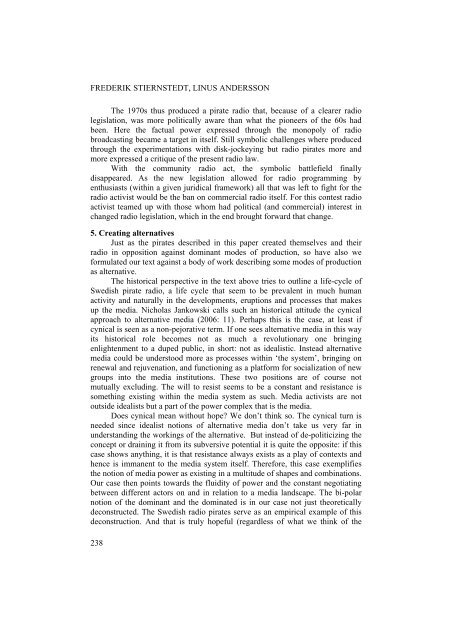culture, subculture and counterculture - Facultatea de Litere
culture, subculture and counterculture - Facultatea de Litere
culture, subculture and counterculture - Facultatea de Litere
Create successful ePaper yourself
Turn your PDF publications into a flip-book with our unique Google optimized e-Paper software.
FREDERIK STIERNSTEDT, LINUS ANDERSSON<br />
The 1970s thus produced a pirate radio that, because of a clearer radio<br />
legislation, was more politically aware than what the pioneers of the 60s had<br />
been. Here the factual power expressed through the monopoly of radio<br />
broadcasting became a target in itself. Still symbolic challenges where produced<br />
through the experimentations with disk-jockeying but radio pirates more <strong>and</strong><br />
more expressed a critique of the present radio law.<br />
With the community radio act, the symbolic battlefield finally<br />
disappeared. As the new legislation allowed for radio programming by<br />
enthusiasts (within a given juridical framework) all that was left to fight for the<br />
radio activist would be the ban on commercial radio itself. For this contest radio<br />
activist teamed up with those whom had political (<strong>and</strong> commercial) interest in<br />
changed radio legislation, which in the end brought forward that change.<br />
5. Creating alternatives<br />
Just as the pirates <strong>de</strong>scribed in this paper created themselves <strong>and</strong> their<br />
radio in opposition against dominant mo<strong>de</strong>s of production, so have also we<br />
formulated our text against a body of work <strong>de</strong>scribing some mo<strong>de</strong>s of production<br />
as alternative.<br />
The historical perspective in the text above tries to outline a life-cycle of<br />
Swedish pirate radio, a life cycle that seem to be prevalent in much human<br />
activity <strong>and</strong> naturally in the <strong>de</strong>velopments, eruptions <strong>and</strong> processes that makes<br />
up the media. Nicholas Jankowski calls such an historical attitu<strong>de</strong> the cynical<br />
approach to alternative media (2006: 11). Perhaps this is the case, at least if<br />
cynical is seen as a non-pejorative term. If one sees alternative media in this way<br />
its historical role becomes not as much a revolutionary one bringing<br />
enlightenment to a duped public, in short: not as i<strong>de</strong>alistic. Instead alternative<br />
media could be un<strong>de</strong>rstood more as processes within ‘the system’, bringing on<br />
renewal <strong>and</strong> rejuvenation, <strong>and</strong> functioning as a platform for socialization of new<br />
groups into the media institutions. These two positions are of course not<br />
mutually excluding. The will to resist seems to be a constant <strong>and</strong> resistance is<br />
something existing within the media system as such. Media activists are not<br />
outsi<strong>de</strong> i<strong>de</strong>alists but a part of the power complex that is the media.<br />
Does cynical mean without hope? We don’t think so. The cynical turn is<br />
nee<strong>de</strong>d since i<strong>de</strong>alist notions of alternative media don’t take us very far in<br />
un<strong>de</strong>rst<strong>and</strong>ing the workings of the alternative. But instead of <strong>de</strong>-politicizing the<br />
concept or draining it from its subversive potential it is quite the opposite: if this<br />
case shows anything, it is that resistance always exists as a play of contexts <strong>and</strong><br />
hence is immanent to the media system itself. Therefore, this case exemplifies<br />
the notion of media power as existing in a multitu<strong>de</strong> of shapes <strong>and</strong> combinations.<br />
Our case then points towards the fluidity of power <strong>and</strong> the constant negotiating<br />
between different actors on <strong>and</strong> in relation to a media l<strong>and</strong>scape. The bi-polar<br />
notion of the dominant <strong>and</strong> the dominated is in our case not just theoretically<br />
<strong>de</strong>constructed. The Swedish radio pirates serve as an empirical example of this<br />
<strong>de</strong>construction. And that is truly hopeful (regardless of what we think of the<br />
238












